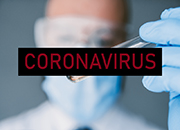- Are You Making This Expensive Thermostat Error This Winter?
- Recognizing the Signs of Hypothyroidism
- 10 Strategies to Overcome Insomnia
- Could Artificial Sweeteners Be Aging the Brain Faster?
- Techniques for Soothing Your Nervous System
- Does the Water in Your House Smell Funny? Here’s Why
- Can a Daily Dose of Apple Cider Vinegar Actually Aid Weight Loss?
- 6 Health Beverages That Can Actually Spike Your Blood Sugar
- Treatment Options for Social Anxiety Disorder
- Understanding the Connection Between Anxiety and Depression
COVID-19 Antibodies Decline Quickly in Donated Plasma: Study

Antibodies against COVID-19 in people who’ve recovered from the disease begin to vanish about three months after they develop symptoms, researchers say.
This suggests that sooner is better for recovered COVID-19 patients to donate antibody-containing blood plasma for convalescent plasma treatment, according to the authors of a small study published Oct. 1 in the journal Blood.
“Based on our findings, antibodies against the new coronavirus are not eternal,” said study author Renée Bazin, director of innovation at Canada-based Héma-Quebec blood center.
Bazin’s team said their findings may prove important for creating vaccines and research into how many people have recovered from COVID-19.
In convalescent plasma treatment, plasma from recovered patients is given to newly ill patients in an attempt to boost their ability to fight the virus.
“While many clinical trials are underway to better understand whether convalescent plasma is clinically beneficial for treating COVID-19, a key question is at what time point is it most effective to collect donor plasma based on the presence of antibodies that help fight the virus,” Bazin said in a news release from the American Society of Hematology.
The study included 15 adults who recovered from COVID-19. Their symptoms ranged from mild to severe, but none were hospitalized.
Each person donated plasma between four and nine times. The first donation was 33 to 77 days after symptoms began, and the last donation was made between 66 and 114 days.
By about 88 days, all 15 donors had decreases in antibodies, and half of detectable antibodies dropped within 21 days after that, the investigators found.
“The antibodies disappear rapidly, so people recovering from COVID-19 who want to donate blood plasma should not wait too long once they become eligible to donate,” Bazin said.
Based on these findings, she said clinicians should check for presence of antibodies before giving donor plasma to a patient.
More information
The U.S. Centers for Disease Control and Prevention has more on COVID-19.
Source: HealthDay
Copyright © 2026 HealthDay. All rights reserved.










